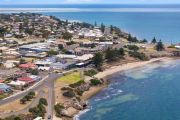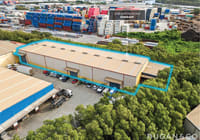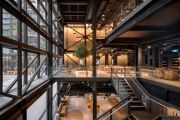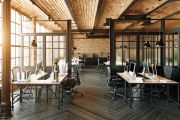
Plans for capsule hotel in Glebe could see it become the biggest in Sydney
A Sydney hotel operator wants to build the biggest capsule hotel in the city within the basement of its existing hotel in Glebe.
Ryals Hotels, at 247-253 Broadway, has lodged a development application to add 100 self-contained capsule “pods” across four rooms in the 680-square-metre basement of its three-storey hotel.
The rooms range from 40 to 96 square metres in size each – equivalent to a large studio or one-bedroom flat – and would contain between 16 and 30 single pods, which can be enclosed.
Each pod would have about 2.85 square metres of space and would include individual facilities, including a bed, lighting, power points and internal storage.
If approved, Ryals’ capsule hotel would be the third to open in Sydney, with the first and second being The Capsule Hotel, which opened mid 2017, and Space Q respectively, both on George Street in the CBD.
Both have 70 rooms and cost between $56 and $90 a night, depending on the pod size.
Another in Tasmania’s Launceston, Pod Inn, is set to open this weekend with 60 pods.
Owner of Ryals Hotels Angus Ryals told Commercial Real Estate said the idea to incorporate a capsule accommodation component in the hotel came about when he first signed the lease for the hotel building in January and saw that there was a disused basement that came with it.
“The previous tenants hadn’t utilised (the basement), they just left it empty and it’s this massive area, it’s an interesting area and it’s just been sat there for 20, 30 years just as a bit of a dungeon store room,” he said.
“We had offers to rent it to someone as a gym, there was a bit of interest in that, then I just thought I wanted to do this (capsule hotel) concept, why not give it a try here?”
The total bill for the project is estimated to cost “just under $1 million”.
Mr Ryals added that the nature of capsule accommodation – being a no-frills, convenience-based lodging – meant that the basement was “perfect” for this type of development.
“Certainly given how the capsules are, you don’t need a view, you’re not in your capsule looking out across the Harbour Bridge.”
The capsule hotel component will also include two communal areas, including a breakout area at the rear of the building, where a kitchen and seating area can be used by guests to prepare their own meals, as well as a waiting room and small bar.
Mr Ryals is aiming to open the capsule hotel component in August-September 2019.
Capsule hotels: a developing sub-sector
The hotelier said the concept was catching on with certain travellers.
“I think it’s where backpackers will probably start to (be) led towards, because they’re a more private type of accommodation and still very price-conscious,” he said.
Mr Ryals acknowledged that there is still stigma among Australians about spending the night in a tiny, confined space, but said that capsule hotels were generally more targeted at international backpackers travelling on a budget.
“I grew up in a motel, I was serving breakfast at the age of about five, so I’ve always been in and around the industry and looking at what’s next, what other people are doing,” he said.
“You talk to some people and they think they’re going to be claustrophobic and all this type of stuff, that’s absolutely fair enough.
“(But) I think it’s a phenomenal concept for someone who might be a single traveller or even (those with) a couple of mates; they don’t want to share a 10-room dorm with other people but they, at the same time, don’t want to sit in a hotel room and pay $300 or $400 a night.”
The hotel operator believes there is a growing market for capsule accommodation in Sydney, given the city’s tourism boom and the subsequent rise in hotel room rates.
“The tourism numbers catch up with the development numbers, we’re always behind from a development point of view. We basically can’t build hotel rooms quick enough to support the tourism, especially with an emerging middle class in China and the weakening Australian dollar,” he said, noting that half of the guests who stay at Ryals are international travellers.
Tourism Accommodation Australia’s chief executive officer Carol Giuseppi attributed the rise in capsule hotels to the growth of international budget travellers who “are seeking more affordable, minimalist accommodation options in the city centre”.
But she believes capsule hotels would remain a niche product.
“Capsule hotels which meet demand from the international budget traveller are one response to this trend, but they are unlikely to be developed extensively,” she said.
“Ultimately the challenge remains: access to sites and cost of land and, therefore, maximising return on investment.”
The bigger trend is the move towards smaller rooms that are space-efficient and design-focused, according to TAA’s recent report The Innovation Revolution Transforming Australia’s Hotel Industry.
More than 1000 hotel rooms are under construction in Sydney, TAA’s latest figures show, with the market’s occupancy rate at 84.9 per cent, according to tourism research house STR’s October data.













